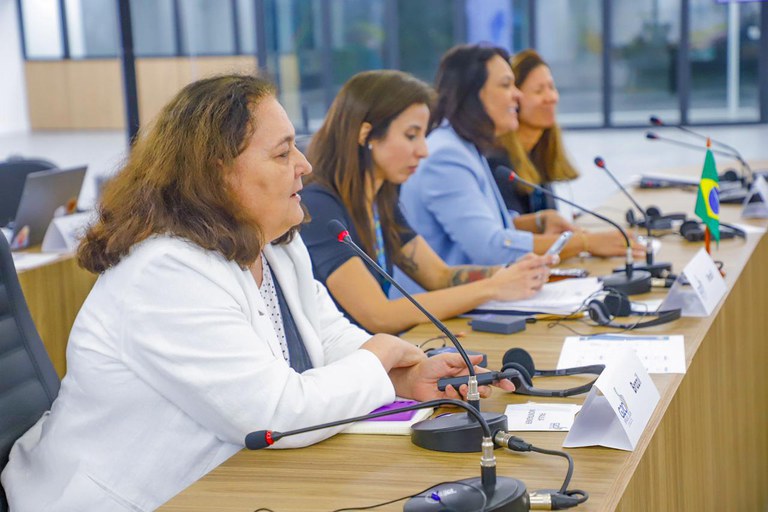Notícias
G20 English
Research shows that inequalities persist in the world of work

Photograph: Matheus Damascena - ASCOM/MTE
Gender inequalities in the world of work persist, making it necessary to look at indicators territorially, in addition to taking advantage of Artificial Intelligence resources to reduce these gaps instead of increasing them. Two surveys with these themes were presented in the last round of discussion of the 2nd Employment Working Group Technical Meeting, of the G20 Brazil, held in Brasília (DF), on the 28th, which aimed to combat inequalities between men and women in the job market.
Artificial Intelligence is advancing by leaps and bounds in the world of work and has caused changes in the skills and abilities required. In a research carried out in partnership with UNESCO, the Organization for Economic Co-operation and Development (OECD) and the Inter-American Development Bank (IDB), it was found that 55% of men have access to the internet, while this number is 48% when it comes to women. This data was presented by IDB work specialist Lívia Gouvêa Gomes.
According to Lívia, some female professions that have more interpersonal and socio-emotional skills have been less threatened by AI. “Traditionally, women focus on care work. On the other hand, women prevail in support and service occupations with lower automation potential. And they are underrepresented in administrative positions that represent 70% of occupations that are most at risk of automation. Women are also underrepresented in more complex positions, which increases the risk of improvement”, explains Lívia Gouvêa.
However, the impact of AI is not so obvious and uniform on the job market, which, according to Lívia, depends a lot on the context, such as social position and, in a broader way, involves economic and cultural issues of women and the countries where they are.
What is certain is that the demand for digital expertise has grown and women have fewer skills in the area of information and communication technology, less digital literacy. In 2019, according to the research in question, women were 35% less likely to use information technology. “Women are underrepresented in the fields of information technology. Therefore, policies and programs are needed to reduce these disparities in digital skills and prepare these women”, highlighted Lívia Gouvêa.
Brazil: it is necessary to analyze indicators by territory
Recently, the Ministry of Labor and Employment (MTE) concluded the first Salary Equality Report, which shows the difference in average salaries between women and men in Brazil, based on information provided by companies with more than 100 employees.
These data were presented by the Undersecretary of Statistics and Labor Studies, Paula Montagner. In it, it is observed that women in the country earn 80.6% of the salary paid to men. The report also shows data by state, which allow us to see territorial inequality.
“The speeches I saw yesterday and today, most of them indicate the average income, the average remuneration, that men and women have. Or, the average salary, practically everyone draws attention to this”, says Paula.
The survey, according to Paula Montagner, pointed out that, in Brazil, 52% of large companies have a job and salary plan, but within the territoriality this has a huge variation, ranging from 42% to 60%. It was also asked whether these companies had policies for women, black women, female heads of households with children, the LGBTQI+ population and whether they had activities for people with disabilities.
“It draws attention that few companies have policies for hiring women, 33% indicated that they do. When analyzing territorially, it is observed that in some states with low demographic density, only 25% of companies answered to having this theme as part of their actions, while, in others with higher density, this percentage is 40%”, she highlights.
Another question was about hiring policies for the LGBTQI+ population. In this regard, the overall average is 20%, and in states with greater visibility it reaches 28, 29%. For policies for hiring black women, the average is 26%, varying territorially between 19% and 35%.
“Note that diversity is also a territorial diversity. To talk about this information and look at just the country's average data has its value, but we need to move forward to also talk about it from a territorial perspective. We are moving forward so that in all territories, all women and all men are involved, here, in the effort we are making to accelerate the processes of equal pay”, assessed Paula Montagner.

